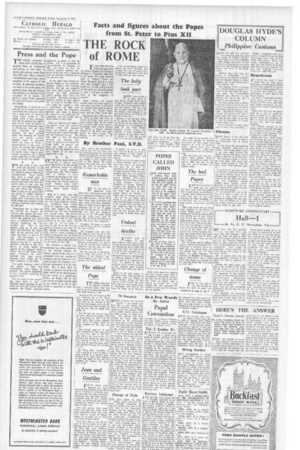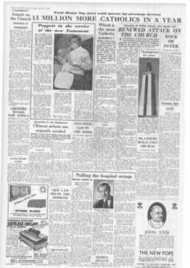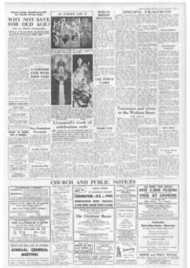Page 4, 7th November 1958
Page 4

Report an error
Noticed an error on this page?If you've noticed an error in this article please click here to report it.
Tags
Share
Related articles
• Reformer John Xxiii On Fast-track To Canonisation •...
A Long Way To Go
Pope Defends Wartime Role Of Pius Xii
Opening Vatican Windows
Pope John's Un1 Versal Love
Press and the Pope
THE world's welcome to Pope John XXIII has, in general, been as widespread and sincere as had been its shock and sadness when Pope Pius XII died. Most Catholics will probably have been rather surprised at the nature of this reaction. It certainly betokens, not least in the world press, the growing sense that the Papacy has become, in a divided world uncertain of its future, the greatest single factor standing for spiritual, moral, and political values.
Nevertheless, it would be unwise for us to attach too much importance to a reaction which has a good deal of emotional "news value" about it. The world, while it may recognise and hail in passing the significance of the Pope of Rome as by far the most important figure in Christianity. has, one fears, little intention of taking seriously the stern teaching about • the meaning of human I i f e and human conduct, whether social or personal, which the Vicar of Christ is commissioned in the name of Christ to defend and preach. And it is this which will save the world rather than a sentimental recognition of a vague moral leadership of the men of good-will in the free world.
'THE sad truth is that even li now the function of the Papacy or the "Vatican" within the world is almost ludicrously misunderstood. Many, doubtless, have a rough idea of Catholic teaching in faith and morals and know well that they cannot take it; but very few have any real understanding of the part which the "Vatican" seeks to play in the mixed field that many be called "politicomoral". They do not, for example, even understand that the whole being and purpose of the Vatican is spiritual and nothing but spiritual.
Everything that is done by the Church, the Papacy, the Vatican—the names are interchangeable in this connection— within the political and social realm is nothing but a means towards furthering the sole spiritual end. Man is one person made up of soul and body, and therefore the attainment of his spiritual end involves his body as well as his soul. His personality is not only therefore subject to its spiritual ends but is constantly spiritually affected by the complexity of living within all aspects of the temporal world. Where any of the latter have direct relevance to man's spiritual end, they m u s t properly come within the indirect authority of the Pope.
The world, however much it may admire a Pope and acknowledge some degree of spirithal and moral leadership in him. is totally unwilling to recognise this.
This of course is not surprising, since there is only a relatively small minority in the world of men and women who recognise the Pope's spiritual
authority as given to him by Christ. but it is ignorance of non-Catholics to suppose, as they too often do, that the Vatican pursues political purposes of its own with a meaning and an ambition divorced from its spiritual end.
At the same time, Popes are human beings, as are Cardinals, bishops, priests, and Catholic layfolk, and no one pretends that their every action follows exactly the high principles which govern their lives and functions. The press, having so properly shown its high regard for the Pope as the first Christian leader has regaled us with a multiplicity of tales and rumours about the Conclave, opinions and views in Rome, the characters and ambitions of Cardinals, and the career and likely policy of the Pope.
There is a human and endearing quality about the contrast between office and purpose within the Church, and one which has been typical throughout the Church's history. We may take it that all these rumours and surmises are based on gossip to be heard in Rome itself. In general, we need not take it all very seriously, but we should be less than human if we did not eagerly lap it up.
ON the other hand, there are journals of opinion which pride themselves on the serious and informed nature of their reports on special subjects. Among them, the "New Statesman" is unlikely to have increased its prestige in the eyes of any reader who knows anything about the Vatican with its article "Rome Goes Left" written by a writer who should know better about things Catholic.
Here is a writer who has evidently gone about Rome picking up any old wife's tale, not only from Catholic sources, but anticlerical ones; mixed them all together; and worked them into support for what doubtless arc his own political and clerical tastes. He cannot even wait to get his hard figures right, since he tells us that one Cardinal is 96 and nearly all are over 70. in fact, none is over 92 and 19 of the 51 Cardinals in Conclave are under 70. He, though a Catholic, thinks that Christ's moral teaching is liable to alteration for the sake of Church policy, and he gives a picture of a curia vastly relieved by the death of Pius XII.
We Catholics in Britain may sometimes be a trifle puritanical in our attitude towards the human aspects of the Church as compared with our continental brethren; but if it keeps us from making fools of ourselves, even though innocently, it is no bad fault. We, at least, shall be content to discover the policy of John XXIII in its development in the course of a pontificate which, we know, will be for the benefit of God's Church and of the world in so far as the world is prepared to heed his words.
blog comments powered by Disqus











